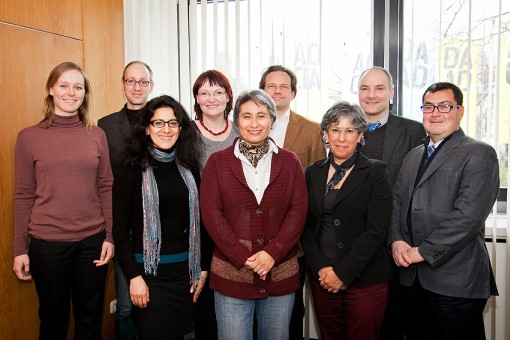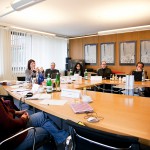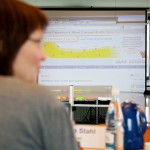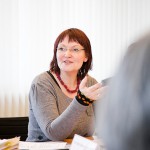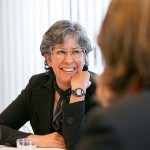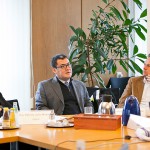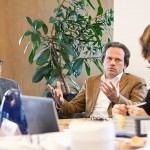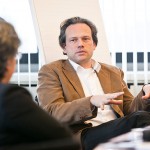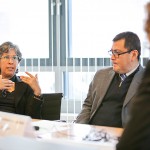The joint multi-national programme in Environment and Resources Management (ENREM) from the Cologne University of Applied Sciences and the Universidad Autónoma de San Luis Potosí in Mexico is six years old this year. The interdisciplinary and intercultural Master’s programme has a lot to offer the 21 students that enroll each year. The beginning of this now successful programme was challenging, however.
The professor-student relationship in Mexico and in Germany differs in many ways from ways of communicating to academic support and advising. These differences were experienced by the students from Cologne University of Applied Sciences who spent two semesters studying in Mexico with the EMREM programme. Exchanges such as these are valuable opportunities for students from Germany, Mexico and other Latin American countries to get to know each other, and for gaining exposure to other academic cultures as well.
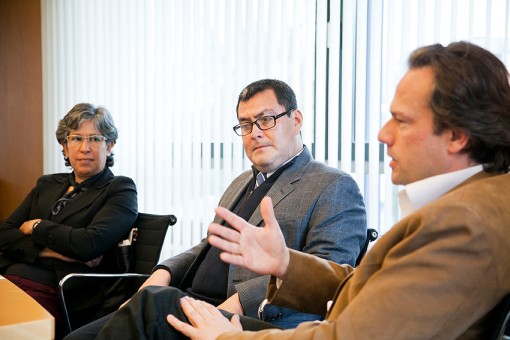
l to r: Dra. Patricia Julio (UASLP), Mtro. Marco Antonio Vargas Bello (CONACYT), Prof. Lars Ribbe (FH Köln)
Photo: Daniela Schmitter
More Mexicans to Germany
These are just some of the aspects that were addressed six years ago when Cologne University of Applied Sciences and the Universidad Autónoma de San Luis Potosí got together to plan their joint, double-degree Master’s programme, the result of a government initiative. “Unfortunately, very few Mexican CONACYT scholars opt for a semester abroad,” says Marco Antonio Vargas Bello from Mexico’s National Council on Research and Technology (CONACYT). “The majority of them are focused on earning a degree at home.”
CONACYT therefore joined forces with the German Academic Exchange Service (DAAD) to find higher education institutions interested in offering multi-national programmes in sustainable development. The programmes were to be geared toward young professionals from Germany, Mexico and other Latin American countries with work experience in the areas of environmental protection, resource management and sustainable development.
Both the Institute for Technology and Resources Management in the Tropics and Subtropics (ITT) at the Cologne University of Applied Sciences and the Universidad Autónoma de San Luis Potosí already had well-established national programmes in this area. The challenge was in bringing the two together, both thematically and administratively. The new course of study was to last 25 months, with two semesters in Mexico, one in Germany, and one reserved for writing the Master’s thesis, either in Germany or Latin America. The challenge for the partners was to find a way to fit everything they deemed important into this short period of time.
Finding the balance
In Mexico, the primary academic focus is on the environmental impacts of the mining industry. In Cologne, the focus is on water management. “We spent the first couple of years discussing how to find the right balance between the partners,” says Lars Ribbe, a professor at ITT. “Both universities have learned a lot from one another in the process.”
For both universities, the hard work has paid off. “The course teaches intercultural competence and flexibility,” says Patricia Julio Miranda from the Universidad Autónoma de San Luis Potosí. “That is why once they finish the programme, our students have career opportunities throughout the world, not just in Latin America.” The students’ professional diversity is also an additional benefit. Their professional backgrounds vary from engineers to lawyers. This rubs off, as is reflected by the multi-disciplinary character of the Master’s theses.
A closer look: Career paths
Both universities keep in close contact with their alumni. Therefore, both can confirm the programme’s positive impact on the participants’ careers. Most graduates achieve better career positions than before. The universities will conduct a study on alumni career paths this year.
In their own words…
Dulce Maria Orozco Corona, Mexico:
“My stay in Germany was an amazing experience and I made the most of it. It wasn’t hard to get used to the German university routine. One of the greatest aspects of the programme is the student exchange. Our experiences will definitely strengthen the ties between Mexico and Germany.”
Lisa Heise, Germany:
“There were definitely some cultural differences at the beginning. It took a while for some of our Mexican counterparts to realise that women can carry their groceries themselves, for example. But all in all, we got along great. We sang Christmas and birthday songs in Spanish, German and English. What makes the Master’s programme so great is its people, who are open and warm, its quality professors and how it enables cross-generational learning and support.”
Image gallery meeting 21.03.2013:
Photos: Daniela Schmitter


